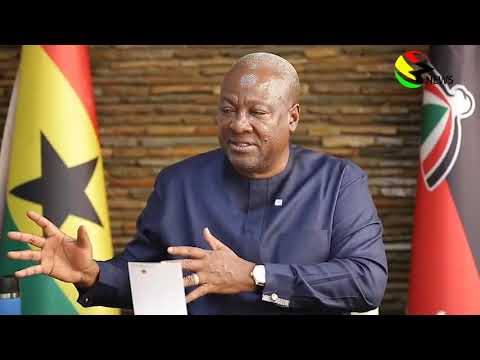As the sun rises on a new chapter for Ghana, we the leadership and entire Global Membership of Transform Africa Now (TAN) extend our heartfelt congratulations to President-Elect John Mahama and the National Democratic Party (NDC) on the resounding victory in the 2024 General Elections.
We also wish to thank the other Presidential aspirants and the good people of Ghana. This remarkable achievement marks not only a victory for a dedicated leader but also a resounding affirmation of the democratic spirit of Ghanaians.
The trust placed in John Mahama -the President-Elect- to lead the nation through its next phase is an honour and a significant responsibility.
As Ghana celebrates this historic occasion, we wish to remind ourselves about the core values that underpin Ghana’s democracy: Freedom of Speech, Respect, Tolerance, and Collaboration. The pathway forward calls for unity among all Ghanaians, irrespective of political affiliation.
We call on Mr President-Elect, and we hope he will work hand in hand with all Ghanaians with experience, both at home and abroad to address the challenges and pressing issues that lie ahead – Youth Unemployment, Food Security, Economic Diversification, and the imperative of Sustainable Development.
As President-Elect John Mahama prepares to take on leadership again, it is imperative to consider the multifaceted challenges and tremendous opportunities that the future holds for Ghana.
This view is set within the dynamics of global geopolitics following the recent US election of President Trump and the evolving economic diplomacy of the West Africa region in the wake of new developments in the Sahel region. Indeed, winning an election is only the first step; what follows is where true leadership is tested.
To this end, we have had an extensive discussion with one of the fine brains in geopolitics and economic diplomacy, our patron, Dr Ishmael Nii Amanor Dodoo an African Human Development Expert, a former Strategic Policy Adviser for the implementation of the UN Secretary General’s Integrated Strategy for the Sahel.
Previously, he served as a Policy Development Advisor to the Executive Office of UN Secretary-General Ban Ki-Moon, Country Advisor to the Assistant Secretary General and Head of UNDP Africa Bureau.
He has also been instrumental in the 2024 elections mobilising grassroots support from Gadangmes and Greater Accra Region to vote through the Gadangme Alliance for Change (GDAC). Based on our deep collective reflection, we recommend the following key areas where President Mahama can focus his efforts to leave a legacy.
- Attitude of Leadership
Leadership attitude is foundational to effective governance. President Mahama should embody a servant-leader approach that prioritises the needs of Ghanaians over political interests. This involves fostering inclusivity by engaging diverse voices in decision-making processes.
By promoting transparency and accountability within his administration, he can build public trust and encourage citizen participation in governance. A positive leadership attitude will inspire civil servants and citizens to adopt a more proactive stance toward national development.
- Honest Conversation to Drive the Reset
An honest conversation about Ghana’s socio-economic challenges is crucial for resetting the nation’s trajectory. President Mahama should initiate national dialogues that address pressing issues such as corruption, economic inequality, and social justice.
These conversations must be inclusive and transparent, allowing citizens from all walks of life to contribute their perspectives. Establishing platforms for open dialogue can help bridge divides within society and foster a collective vision for the future.
- Constitutional Reform
Constitutional reform is essential for strengthening Ghana’s democratic institutions. President Mahama should prioritise and take bold steps to initiate amendments that enhance checks and balances within government structures while ensuring greater accountability from elected officials.
Key areas for reform may include electoral processes, decentralisation of power to local governments, and mechanisms for citizen engagement in governance. By reinforcing democratic principles through constitutional changes, President Mahama can help safeguard Ghana’s political stability.
- Human Capital Strategy
Investing in Human Capital is vital for sustainable development. Without the rightly skilled human capital, attempts to bring Ghana to the level to compete on the global stage will remain stagnated.
This includes enhancing skills training programs that align with industry demands to reduce unemployment rates among youth. Furthermore, improving healthcare systems will ensure a healthier workforce capable of contributing effectively to economic growth.
Our workforce needs to be afforded the best healthcare to prolong their period of productivity. President Mahama’s administration should develop a comprehensive strategy for healthcare access, vocational training, and workforce development tailored to market needs.
- Workforce Academy
We urge President Mahama to focus on developing a Workforce Academy to bridge the skills gap for the opportunities in the international and local modern job market. It can become a transformative initiative designed to equip individuals with the essential skills to navigate this complex environment.
Workforce Academy aims to bridge the gap between employers and job seekers, fostering a more prosperous workforce for the future. With companies struggling to find qualified candidates with the requisite skills, and job seekers often lacking access to quality training resources, the Academy will provide a vital solution.
It is an inclusive program that targets individuals from diverse backgrounds, including recent graduates, career changers, veterans, and those struggling to enter the workforce. As we look towards the future, initiatives like Workforce Academy will play a crucial role in shaping a resilient and skilled labour market, ready to tackle the challenges of an ever-changing world.
- Educational Reforms
Educational reform is critical for equipping future generations with the skills necessary for success in an increasingly globalised economy. President Mahama should prioritise curriculum updates that emphasise Science, Technology, Engineering & Mathematics (STEM) education alongside critical thinking and problem-solving skills.
Additionally, increasing investment in teacher training programs will enhance educational quality across all levels of schooling. Collaborating with international educational organizations could provide valuable insights into best practices.
- The Case Study of South Korea
South Korea is an exemplary case study of rapid economic transformation through strategic planning and investment in technology and education in the Post-War era (1950s).
Ghana can learn from South Korea’s emphasis on industrialisation driven by government support for key sectors such as electronics and automotive manufacturing while investing heavily in education and research institutions to cultivate innovation capacity among its populace.
- Resource Mobilization/ Innovative financing
Effective resource mobilisation strategies are essential for financing developmental projects without over-reliance on foreign aid or loans that may lead to unsustainable debt levels.
President Mahama should explore innovative financing mechanisms such as public-private partnerships (PPPs) which have proven successful in various sectors globally including infrastructure development and service delivery improvements.
- Blended Finance
Blended finance combines public or philanthropic funds with private sector investments to achieve development goals. Ghana can explore this approach to mobilise additional resources for critical sectors such as Renewable Energy, Agriculture, and Healthcare.
For instance, partnerships between the Government and Private Investors can lead to Public-Private Partnerships (PPPs) that leverage Private Capital while minimising risks associated with investment in developing markets.
- Impact Investing
Impact investing focuses on generating social or environmental benefits alongside financial returns. In Ghana, impact investors can help improve Education, Healthcare Access, and Sustainable Agriculture initiatives.
By attracting impact capital from local and international investors, Ghana can support enterprises that address pressing social issues while providing a return on investment.
- Green Bonds
Green bonds are debt instruments specifically earmarked for financing environmentally friendly projects. Given Ghana’s commitment to sustainable development and climate resilience, issuing green bonds could attract investment in Renewable Energy Projects, Reforestation efforts, and Sustainable Agriculture practices.
The issuance of green bonds would also signal Ghana’s dedication to combating climate change.
- Diaspora Bonds
Ghana has a significant diaspora population that is often willing to invest back home. Diaspora bonds are debt securities issued by a country specifically targeted at its citizens living abroad.
These bonds would enable Ghanaians overseas to contribute financially to national development projects while earning interest on their investments.
- Social Impact Bonds (SIBs)
Social Impact Bonds are outcome-based financing where private investors fund social programs upfront and are repaid by the government only if the programs achieve specified outcomes.
This model could be particularly effective in sectors like Education and Health in Ghana. For example, an SIB could fund a program on maternal mortality rates; if successful, the government would repay investors based on achieved results.
- Crowdfunding
Crowdfunding platforms allow individuals or organisations to raise small amounts of money from people via the internet.
This method can be utilised in Ghana to finance community-driven projects such as local infrastructure improvements or social enterprises focused on poverty alleviation. By harnessing the power of technology and community engagement, crowdfunding can democratise access to capital.
- Development Finance Institutions (DFIs)
Development Finance Institutions play a vital role in providing long-term capital for development projects in emerging markets like Ghana.
DFIs can offer loans or equity investments tailored to local conditions while supporting sectors critical for economic growth such as infrastructure development and small-to-medium enterprises (SMEs). Collaborating with DFIs can help bridge the financing gap for many businesses in Ghana.
- Value Chain Development: Agriculture, Energy, and Manufacturing
To stimulate economic growth sustainably, focusing on value chain development across agriculture, energy production, and manufacturing is crucial:
- Agriculture: Enhancing agricultural productivity through modern farming techniques while ensuring food security requires investments in research and development (R&D), irrigation systems improvement and access to markets.
- Energy: Transitioning towards renewable energy sources to address climate change and energy, security. Initiating policies promoting solar power initiatives could be beneficial.
- Manufacturing: Strengthening local manufacturing capabilities through incentives can reduce import dependency while creating jobs; this necessitates collaboration between government agencies and private sector stakeholders.
In conclusion, President-elect John Mahama has an opportunity to leave a significant legacy by addressing these critical areas with strategic foresight rooted in inclusivity and sustainability principles.
Authors:
Richard Leigh & Africanus Annan II
Lead Consultants
Leadership, Diaspora Engagement & Youth Development
Transform Africa Now Initiative

















